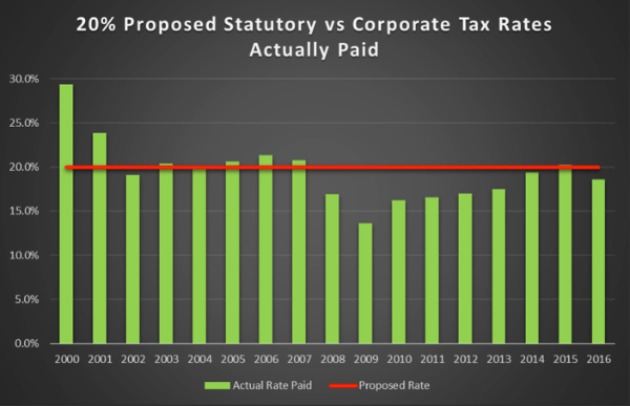Make corporate tax cuts conditional on benefit to US workers

Republicans have proposed reducing the statutory corporate tax rate from 35 percent to 20 percent. While the statutory rate gets all the headlines, it is like the manufacturer’s suggested retail price (MSRP) — the actual rate is much lower.
In fact, despite lowering the statutory corporate tax rate, if companies paid the 20-percent rate and all current tax deductions available to companies were eliminated, the tax rate paid by companies would increase — yes, increase.
{mosads}Based on Bureau of Economic Analysis data, the average rate actually paid by companies was 18.6 percent in 2016 and averaged 19.5 percent since 2000.
If we had a 20-percent corporate statutory tax rate and companies paid the 20-percent rate without the current tax deductions, the average tax rate paid by companies would have been higher than what they paid in nine of the last 17 years.
 (Source: Solutionomics and the Bureau of Economic Analysis)
(Source: Solutionomics and the Bureau of Economic Analysis)
Now, we all know that good lobbying on behalf of significant campaign contributors will ensure that many corporate tax deductions will remain in place. Rather than playing this game of, “We are going to lower the statutory rate but also eliminate deductions,” let’s just be honest: The actual corporate tax rate companies are paying is going down.
If that is the case, let’s make sure lower tax rates go to companies creating jobs in America, companies that are paying higher wages, companies providing employer-funded health insurance and to small business owners.
If the goal of corporate tax cuts is job creation, we need to make tax cuts contingent on job creation. We must base each company’s tax rate on its rate of job creation.
This would be very different from current proposals, which would give the same tax cut to companies firing Americans and sending jobs overseas as is given to companies creating American jobs — that’s irresponsible policy.
Ford is moving production of its Focus to China, while Toyota and Mazda are looking to build new plants in the U.S. Why would we give the same tax break to Ford as to Toyota and Mazda?
Next, if the goal of corporate tax cuts is higher wages, we should tie each company’s corporate tax rate to its wages relative to its competitors. Companies paying higher wages have earned a tax break; companies paying the lowest wages have not.
The average wage of Costco’s cashier positions listed on Payscale.com was $13.45 per hour while Sam’s Club’s average was $10.07. Why would we give the same tax break to Sam’s Club as we would to Costco?
Tax reform can also be tied to health-care reform. Companies that provide health insurance to their employees reduce the demands on government-provided health insurance, thus reducing government spending. Company-provided health insurance can also increase consumer purchasing power by reducing the dollars consumers need to allocate to purchasing health insurance.
Given the broad potential impact of company-provided health insurance on economic growth, we can obtain a greater return on our corporate tax cuts if we tie each company’s tax rate to whether it provides health insurance to its employees.
In 2014, Target eliminated health insurance coverage for part-time workers while Costco maintained health insurance. Why would we give the same tax break to Target as we would to Costco?
Last, small business owners need help. Tie each company’s corporate tax rate to its percentage of employees based in the U.S. This would disproportionately benefit small businesses because they would generally be expected to have a higher percentage of their workforce based in the U.S.
As a result, they would pay a lower tax rate than large, multinationals with more globally-based employees. Company-offshoring-decisions would also be impacted.
Companies offshoring American jobs leading to a net reduction in their American employee base would pay a higher tax rate than companies maintaining the number of Americans employed, thus creating an incentive to maintain their American employment levels.

While lowering the statutory corporate tax rate from 35 to 20 percent is getting all the headlines, the real question is why aren’t the tax cuts conditional? We need a better return on the proposed tax cuts. We need targeted tax cuts that are tied to company actions, not lobbyists’ actions.
Chris Macke is the founder of Solutionomics, a think tank that is focused on developing solutions and recommendations for a more efficient, merit-based corporate tax code; replacing damaging global trade myths and policies and maintaining a financial system that provides a stable source of capital for consumers and businesses.
Copyright 2023 Nexstar Media Inc. All rights reserved. This material may not be published, broadcast, rewritten, or redistributed. Regular the hill posts







